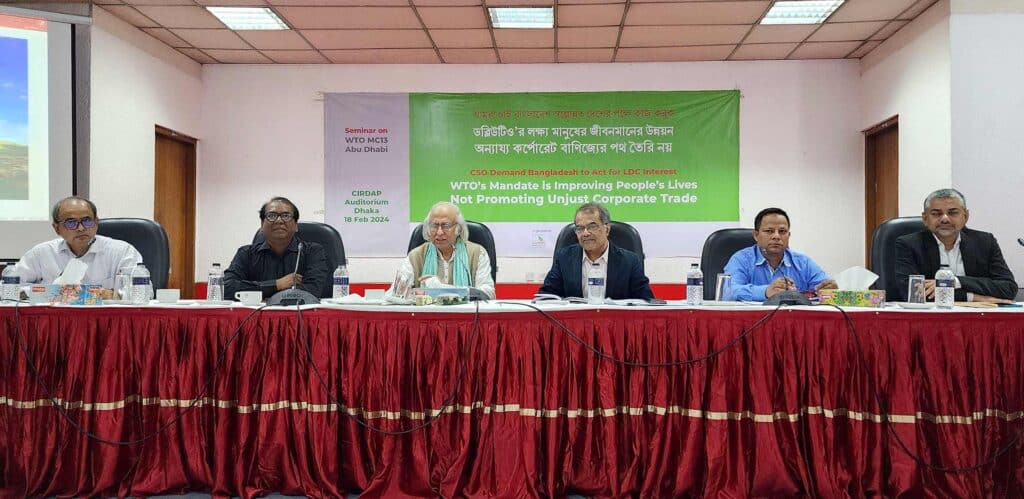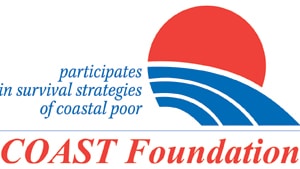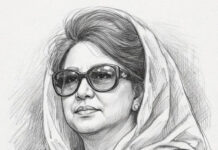Draft Position Paper on WTO Seminar in Bangladesh
Opinion expressed in the seminar is reflected here
We want Bangladesh to act for Least Developed Countries
WTO’s Mandate is to Improve People’s Lives
Not to Facilitate the Unfair Corporate Trade
Introduction
WTO is the official international organisation that sets rules for global trade and resolves disputes if necessary. After three decades of domination, it has nowadays come under criticism from the global civil society for its roles and decisions. The main point of criticism is that, although they say their main goal is to improve people’s living standards through the expansion of trade. But, in reality, they have repeatedly focused on expanding the trade of the wealthiest corporations in rich countries and maximising their profits. We think the main reason for this is the influence of rich countries and their corporations on it.
One positive change is that they have created opportunities for civil society participation alongside government delegations at WTO ministerial conferences for the last few years. Civil society worldwide is now working to positively engage with their government delegations regarding their country’s trade situation, human rights, and poverty alleviation plan while attending the WTO ministerial conferences. Some governments, especially of the least developed or developing countries, are now somewhat aware of the hidden costs of the trade offers, and their active participation is causing WTO’s decision-making to be delayed or sometimes postponed. However, the advantage is that monopolist and rich countries cannot impose their corporate decisions at their convenience.
However, the least developed countries have not fully enjoyed the benefits yet. Many decisions are still forced and favoured by the rich countries, or rather by the neoliberal economies. Nonetheless, the LDC managed to get some benefits like TRIPS Waiver, Duty-Free Quota-Free access, etc. However, many of them are yet to be implemented.

Bangladesh Situation
Bangladesh has been known as a less developed country until now. However, it will enter the ranks of developing countries within two years. Then, many of those advantages will not be the same for them. Bangladesh now has to compete directly with many other developing countries and even with developed countries and their multinational companies. We still do not have a fraction of the capabilities, capital, technology and trade skills needed to compete with developed countries and their multinationals. We cannot achieve it in such a short period of time. It is being said (with no guarantee) that some benefits will continue for the newly graduated LDCs until their graduation becomes sustainable.
Bangladesh needs to be very well-planned to meet the challenges of the changing situation. The plans should include crop production and the stability of its price, food security of poor people, reduction of import-dependence of some crops in the off-season, development of farmers’ capacity, possibilities of marine fishing and blue economy in the fisheries and aquatic sector, fishers’ capacity development including technology and capital, and how to grow the medicine industry without the TRIPS waiver. The government of Bangladesh has started working on some of the agenda. However, its success will depend on raising the demands and negotiating in favour of them. They need to establish unity with other like-minded countries on its behalf.
Agriculture, Fair Prices of Crops and Food Security
Japan, according to their Ministry of Agriculture, subsidises their agriculture by 25-28 billion dollars annually (Nikkei Asia, 30 Jan 2024). These subsidies include price support, production support, risk insurance, oil, etc. Agricultural subsidies in the US and Canada are also very high and sometimes unquantifiable as those are given in different names. However, the debate of public stockholding in WTO to provide reasonable prices of crops to the poorest farmers of poor countries as well as for food security of poor people was not solved in the last 4-5 ministerial conferences. At least it’s clear that WTO doesn’t care about the food security of poor people, though they promote this as their mandate.
Fisheries, marine fisheries, blue economy and subsidies
Rich countries provided nearly $35 billion subsidy in 2018 in their marine fisheries, of which small-scale fishers received 19%, while 80% was given to large corporate fishing companies to establish a monopoly on the world’s fisheries. In one year of this subsidy, they spent $8 billion on oil only. On the other hand, they are now discouraging developing and least developed countries from subsidising the fisheries sector. The reason, they say, is that these subsidies will contribute to the loss of fish resources and will be contrary to the United Nations’ Sustainable Development Goals. After completing their own development in the fisheries sector, they have started blocking the developing and least developed countries. They are unwilling to accept the demand of technology transfer as an alternative.
E-commerce moratorium on Customs Duty
In its Second Ministerial Conference in 1998, WTO imposed a moratorium on customs duties on electronic transactions to expand trade in digital goods. This is known as the e-commerce moratorium. Rich countries benefit as they monopolise digital trade by exploiting the lack of technological advantages of least developed and developing countries. On the other hand, LDCs and developing countries are deprived of huge revenues. The South Center, a trade research institute, showed in a study that these sanctions cost developing and least developed countries 56 billion dollars in revenue over the five-year period 2017-2022 (Rashmi Banga, 2022). The moratorium is still going on, ignoring the demands of the affected countries.
Medicine industry, TRIPS waiver, and after Covid situation
A kind of TRIPS waiver has been granted till 2034 for the development of emerging pharmaceutical industries in the LDCs and developing countries. However, there does not seem to be much assurance, or there is a laxity in implementation. LDCs, however, demanded that this period be granted until they became sustainably developing countries. In particular, discussions began about flexibility in testing and treatment of COVID-19. It was hoped that a decision in this regard would be found in the upcoming Thirteenth Ministerial Conference. However, the WTO yet to come to any decision in this regard due to the pressure of the monopolist pharmaceutical companies of the rich countries. There is no sign of any agreement either.
Conclusion
We have always had confidence in Bangladesh’s official delegation to the WTO. We believe, this time too, Bangladesh will go for the negotiation fully considering the goals of poverty alleviation, human rights, and SDG implementation. We also believe Bangladesh will formulate and implement the development plans for facing the challenges as a developing country after graduation. We want to stand up for the demands of the least developed and developing countries in the MC13 of WTO, especially in the agriculture, fisheries and e-commerce sectors. We want human rights and poverty alleviation to be prioritised above corporate profits.
Our Recommendations for Bangladesh to:
- Negotiate for the immediate implementation of the commitments made by the WTO at the MC12 to sustain the transition of the graduating least developed countries and to establish unity with the ally countries.
- Hold the position of leading the LDCs’ demands in WTO in the past few years, continue to work in favour of the LDC interest, and establish the opinion to realise those benefits fully for a few more years for its sustainability even after graduation.
- Demand protection for the poor farmers of Bangladesh from the heavily subsidised agro-companies and open competition with the subsidised exports, along with the binding rules for the meaningful implementation of it. Because it is involved in implementing SDG, establishing human rights, and alleviating poverty.
- Support the demands raised in WTO for the distribution of food to the poor and vulnerable people at low cost and/or free of charge during any adversity and disasters, for ensuring fair prices for crops, and for raising demands for obligations to implement them.
- Take a strong position in WTO well ahead based on the thorough assessment of what will happen to Bangladesh’s emerging pharmaceutical industry after the TRIPS waiver and what kind of impact it will have on people’s access to medicine and treatment as a developing country in the future. Establish unity with other countries in this regard. Formulate national policies, build national capacity, and allocate budgets for the pharmaceutical industry to be able to compete with other international pharmaceutical companies in the future.
- Immediately formulate appropriate plans for capacity building of the fisherfolks, especially in the marine fisheries sector. Ensure government allocations for technology development and efficiency in fishing. Keep small-scale and poor fishers out of the global subsidy debate and ensure allocations to improve their capacity and efficiency.
- Negotiate for the DFQF as appropriate for Bangladesh because it got DFQF access in some cases without proper benefits for the country. Many countries are giving this access facility for Bangladesh except for its main export product, readymade garments.
- Negotiate to bring back the lost revenue of the less developed and developing countries due to the e-commerce moratorium and free and unfair trade of the big-tech companies or demand other facilities in exchange. Before allowing foreign e-commerce platforms to trade freely in Bangladesh, the capacity development of domestic e-commerce platforms needs to be enhanced. An accountable e-commerce environment needs to be ensured along with capacity building, especially for small and medium entrepreneurs. Foreign e-commerce platforms should pay revenue to LDCs and developing countries.




